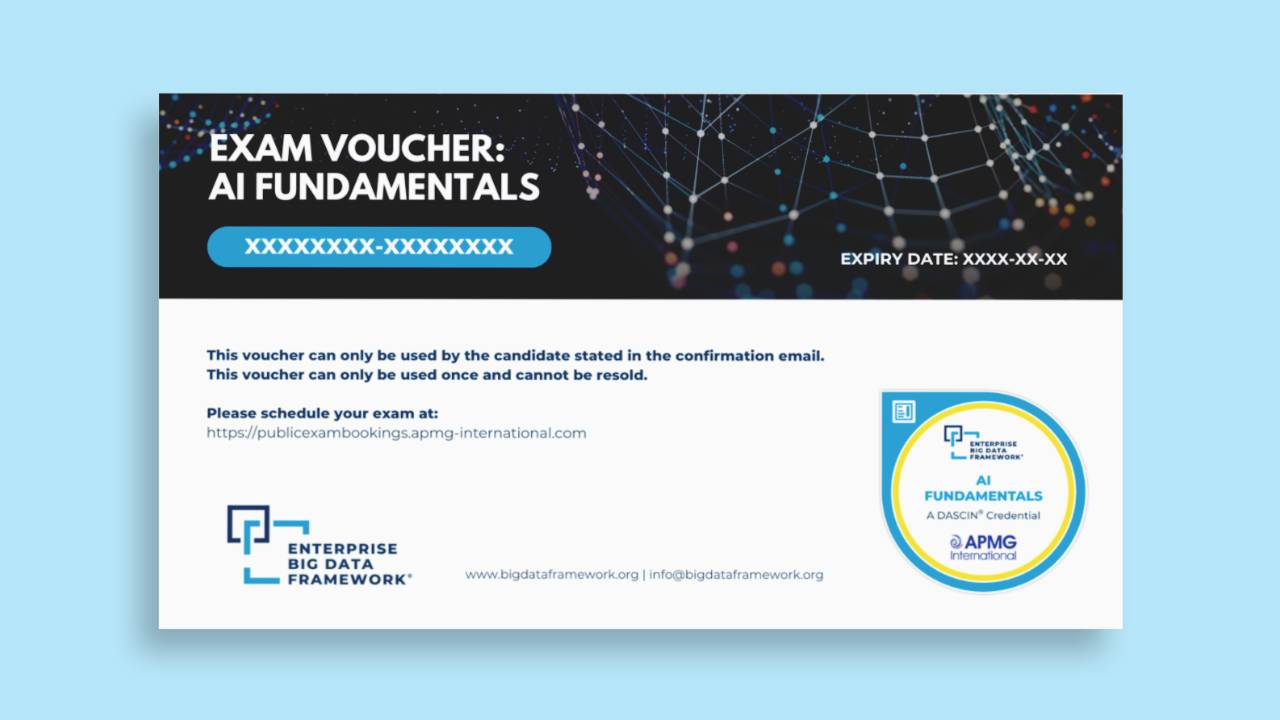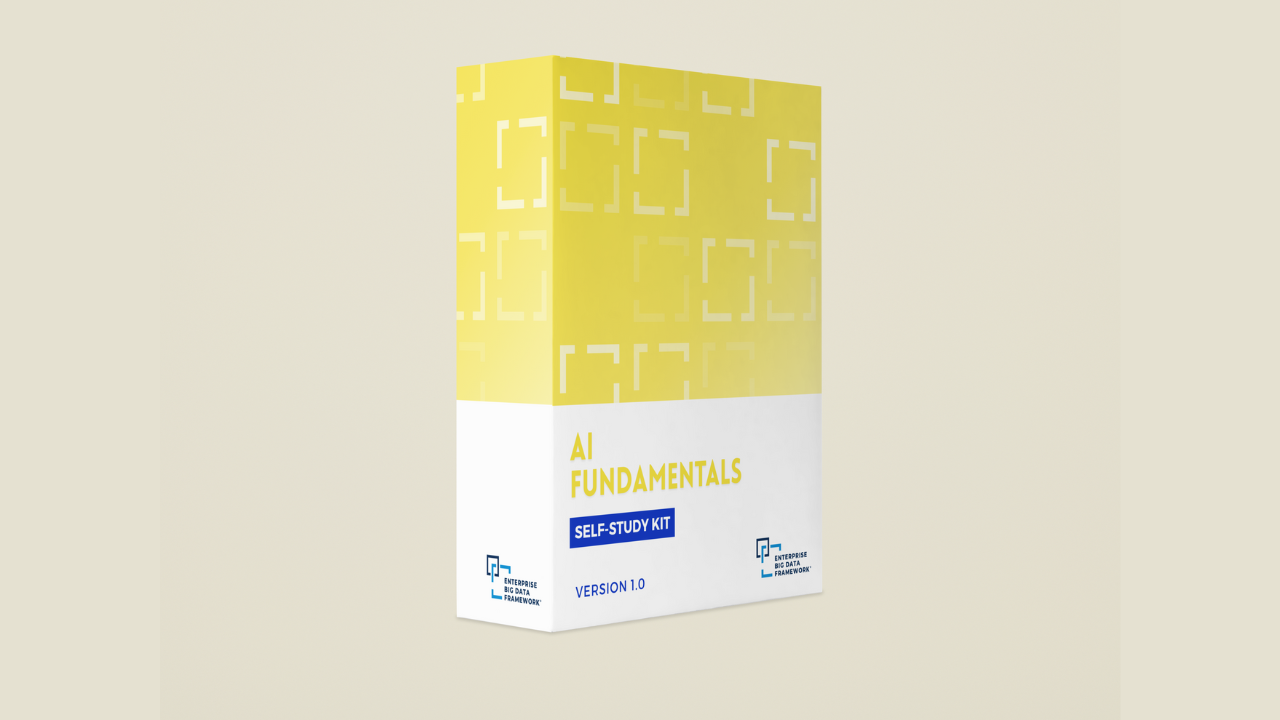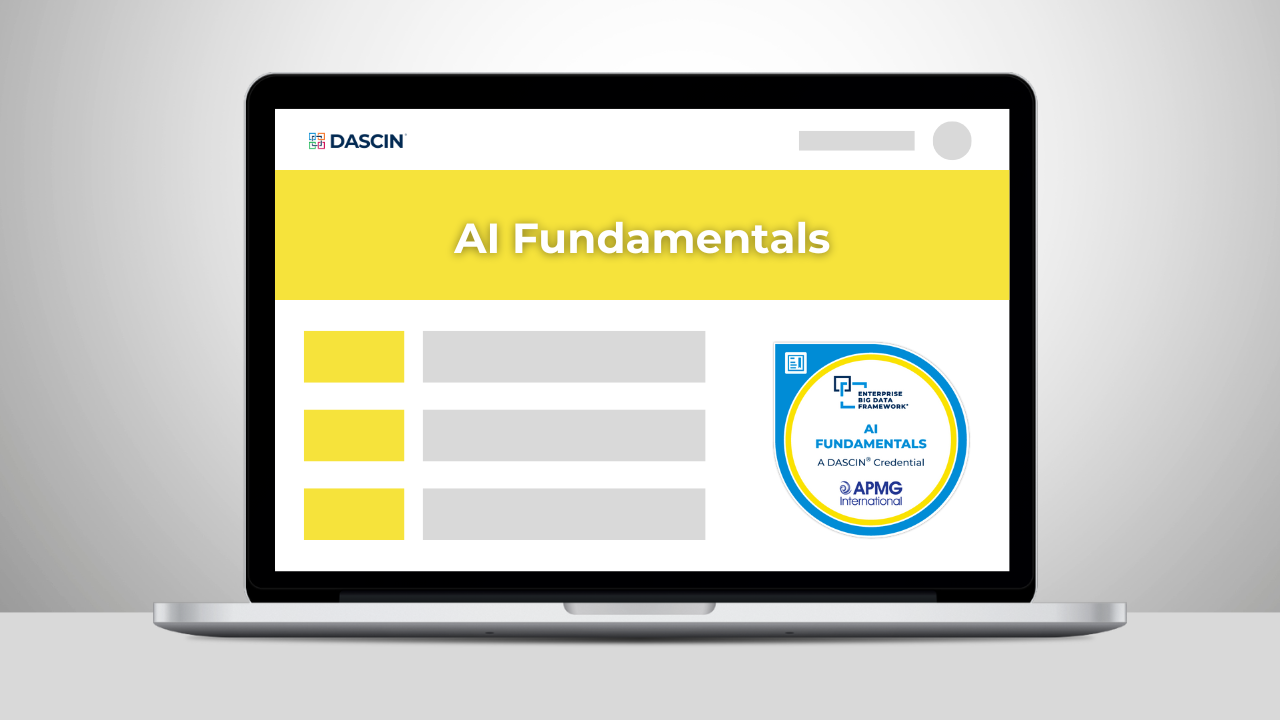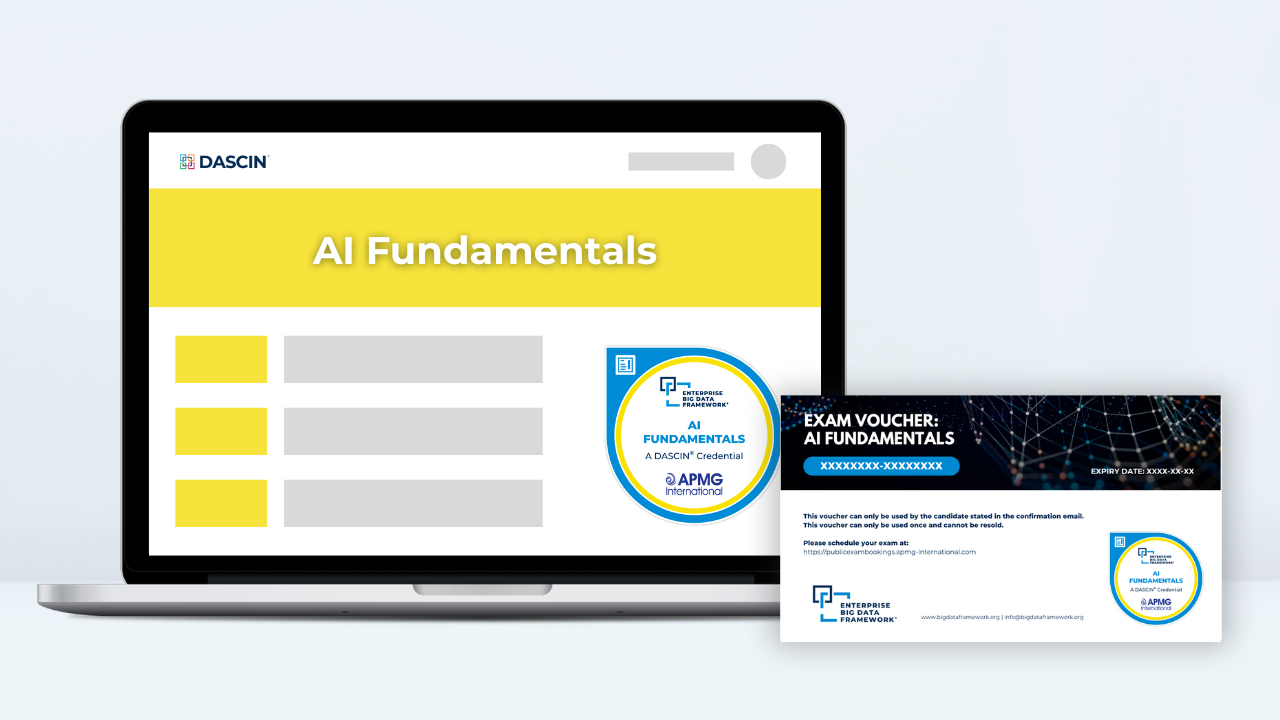Course Summary
The Artificial Intelligence Fundamentals (AIFU®) Certification, developed under the DASCIN® Enterprise Big Data Framework, provides professionals with a comprehensive foundation in Artificial Intelligence (AI). Unlike AI Awareness programs, which focus on recognizing AI's societal and business impact, the Fundamentals course emphasizes the conceptual, technical, and enterprise dimensions of AI.
Participants explore AI's philosophical origins, rational agents, search strategies, reinforcement learning, neural networks, and large language models (LLMs), alongside principles of responsible AI adoption in organizations. Through a combination of conceptual learning, hands-on lab exercises, and case-based discussions, the course prepares participants to evaluate, implement, and govern AI initiatives effectively and ethically within enterprise contexts.
By completing this certification, participants will gain the knowledge and skills to understand and explain core AI principles, apply search and problem-solving techniques, implement reinforcement learning and neural network concepts, interpret large language models, and support responsible AI adoption aligned with organizational strategy. Whether the goal is to enhance organizational AI capabilities, advance professional expertise, or develop applied AI literacy, the Artificial Intelligence Fundamentals (AIFU®) Certification provides a critical foundation for understanding and leveraging AI's transformative potential.
detailed course Information
The Artificial Intelligence Fundamentals (AIFU®) course provides participants with a comprehensive understanding of Artificial Intelligence, its core principles, and its applications in enterprise contexts. Upon completion, participants will be able to:
- Explain the foundational concepts of AI, including its philosophical origins, history, goals, and evolution, and understand its role in shaping modern technology, business, and society.
- Describe rational agents, task environments, and intelligent behavior, and evaluate how these concepts underpin AI problem-solving and decision-making frameworks.
- Apply search and problem-solving techniques, including uninformed and informed search algorithms such as BFS, DFS, and A*, to structured tasks and real-world scenarios.
- Understand and implement reinforcement learning principles, including reward-based learning, Q-learning, and policy optimization, and assess their applications in adaptive and autonomous systems.
- Analyze the functioning of neural networks, including perceptrons, activation functions, and backpropagation, and evaluate their role in modern AI applications such as pattern recognition, image processing, and predictive modeling.
- Examine the architecture and mechanisms of large language models (LLMs), including transformers and attention mechanisms, and assess their potential for generative AI and enterprise applications.
- Evaluate AI strategies for enterprise implementation, considering business alignment, governance, ethical standards, and responsible adoption, and design AI solutions that create measurable value while mitigating risks.
This course equips participants with the knowledge and skills to confidently engage with AI technologies, apply theoretical concepts in practical scenarios, and support responsible and strategic AI initiatives within organizations, preparing them for success in an AI-driven enterprise.
The Artificial Intelligence Fundamentals (AIFU®) course provides a comprehensive and practical understanding of how Artificial Intelligence is applied in real-world enterprise settings. Designed to bridge the gap between AI concepts and business implementation, the course explores essential AI technologies and methodologies, including search algorithms, reinforcement learning, neural networks, and large language models (LLMs), while emphasizing ethical and responsible adoption in organizations.
A central focus of the program is its final module, which empowers participants to evaluate AI’s strategic, operational, and ethical impact within an enterprise. It introduces essential frameworks and tools to ensure AI initiatives are aligned with business goals and deployed responsibly.
Module 1: AI Concepts and Foundations
This applied module focuses on understanding the foundational principles of AI and their relevance to enterprise applications. Participants will learn to define AI, differentiate between Weak and Strong AI, and explore ethical considerations in adoption. The module also covers the PEAS framework and examines symbolic versus statistical approaches to AI. Key topics include:
- Differences between Weak AI, Strong AI, and general AI in practical and theoretical contexts
- Understanding the PEAS framework components: Performance, Environment, Actuators, and Sensors
- Characteristics of symbolic and statistical AI approaches and example applications in Python
- Assessing AI’s role in enterprise decision-making and intelligent system design
Module 2: Search Problems
This module emphasizes the practical application of AI problem-solving using search algorithms. Participants will define states, actions, and goal representations, and explore properties of common uninformed and informed search algorithms. The module includes:
- Uninformed search algorithms: Breadth-First Search, Depth-First Search, and Uniform-Cost Search
- Informed search methods, including A* and Greedy Search with heuristic evaluation functions
- Adversarial search techniques such as Minimax and Alpha-Beta pruning
- Selecting and applying suitable search techniques to problem scenarios in Python
Module 3: Reinforcement Learning
Participants will explore how AI agents learn to make decisions through interactions with their environment. The module covers the core components of reinforcement learning and their applications in enterprise and experimental settings. Topics include:
- Key components of reinforcement learning: Agents, Actions, States, and Rewards
- State transitions and reward functions and their impact on agent behavior
- Principles of the Bellman equation, temporal difference learning, and Q-learning
- Optimization approaches and interpretation of Q-learning results in Python
Module 4: Neural Networks
This module introduces neural networks and their practical applications in AI systems. Participants will understand the components, architectures, and challenges of neural network models. The module includes:
- Components of artificial neural networks: Weights, Biases, and Activation Functions
- Backpropagation, gradient descent, and model training processes
- Key architectures: Convolutional Neural Networks (CNNs), Recurrent Neural Networks (RNNs), and Long Short-Term Memory (LSTM) networks
- Recognizing overfitting, vanishing gradients, and regularization methods, with hands-on Python exercises
Module 5: Large Language Models (LLMs)
This module focuses on understanding LLM architectures and their enterprise applications. Participants will explore transformer models, training processes, and ethical considerations. Topics include:
- Transformer architecture components: Self-Attention, Positional Encoding, and Multi-Head Attention
- Pre-training and fine-tuning processes for LLMs
- Role of prompts in influencing model outputs
- Common LLM applications such as summarization, translation, and chat systems
- Ethical and societal implications of LLMs, with practical Python exercises for model implementation
Module 6: AI for the Enterprise
The final module equips participants to assess AI’s strategic, operational, and ethical impact in organizations. It covers frameworks and practices for integrating AI initiatives responsibly. Topics include:
- Understanding how AI creates business value through efficiency, innovation, and value chains
- Stages of the AI project lifecycle and alignment with enterprise strategy
- Principles of responsible AI adoption and governance
- Applying AI strategic thinking to use cases in Python
- Ensuring ethical, secure deployment and compliance with relevant regulations
This programme provides participants with both theoretical understanding and practical skills, preparing them to implement, evaluate, and govern AI solutions responsibly within enterprise contexts.
The Artificial Intelligence Fundamentals (AIFU®) course is designed for a diverse audience of professionals, students, and enthusiasts seeking a comprehensive understanding of Artificial Intelligence and its applications. It is particularly suited for:
- Business Leaders and Decision-Makers: Executives, managers, and entrepreneurs who want to understand how AI can drive innovation, improve efficiency, and create strategic value within their organizations.
- Professionals Across Disciplines: Project managers, analysts, consultants, and specialists from any field who wish to explore AI methodologies, concepts, and enterprise applications.
- Students and Academics: Learners from undergraduate and postgraduate programs in technology, business, or related fields, as well as educators seeking to expand their understanding of AI principles and trends.
- Industry Practitioners: Individuals in sectors such as healthcare, finance, retail, manufacturing, and public services who want to understand AI’s impact and learn how to leverage AI in their domain.
- AI Enthusiasts and Curious Learners: Individuals passionate about technology and innovation who wish to explore the foundations of AI and its transformative potential.
- Policy Makers and Regulators: Government officials, advisors, and compliance professionals who need insights into AI governance, ethics, and societal implications.
This course is accessible to both technical and non-technical audiences, requiring no prior experience in AI or programming, and is ideal for anyone eager to understand the fundamentals of AI and its potential to shape organizations, industries, and society.
The AI Fundamentals course concludes with an official APMG Examination, designed to validate the participant’s understanding of core AI concepts and principles. This structured assessment ensures that learners have grasped the foundational knowledge required to engage with AI confidently. Below are the key details about the examination:
- Material Allowed: This is a closed book exam. Study materials, including the course guide, are not permitted during the examination.
- Exam Duration: The exam is 60 minutes long. Candidates taking the exam in a language other than their native or working language receive an extra 25% of time, extending the duration to 75 minutes.
- Marks and Scoring: The exam consists of 40 multiple-choice questions, each worth 1 mark. There is no negative marking, and unanswered questions will receive no marks. To pass, participants must score 26 marks (65%) or more. An elevated pass mark of 30 marks (75%) is required for individuals aspiring to become trainers.
- Complexity: The exam covers Bloom’s Levels 1 and 2—Level 1 tests recall of AI basics, while Level 2 assesses understanding through tasks like explaining algorithms, summarizing reinforcement learning, and analyzing neural networks or large language models.
- Question Types: All questions are multiple-choice with four options and include classic, negative, missing word, and list-style formats to assess comprehension and practical application.
This examination is designed to confirm that participants have achieved a solid foundation in Artificial Intelligence, enabling them to evaluate AI capabilities, interpret model behaviors, and support responsible AI adoption within real-world enterprise contexts.
Digital Badge
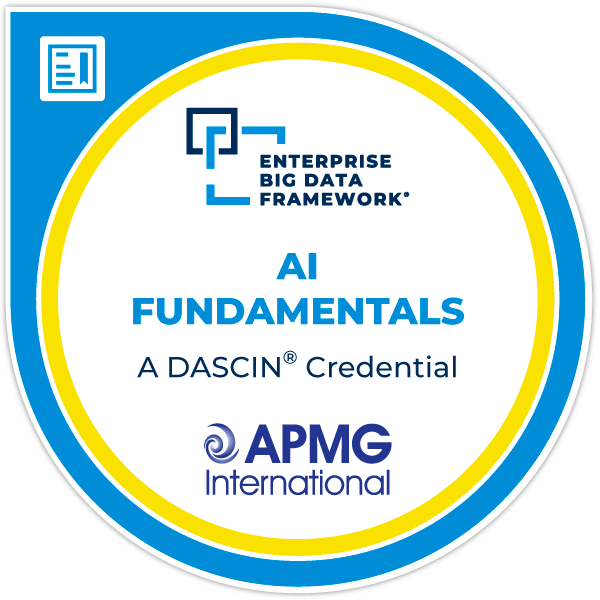
Course Details
Testimonials & Course Reviews
The AI Fundamentals course was an eye-opening experience that transformed my understanding of Artificial Intelligence. What set this course apart was the depth of content on Machine Learning and Deep Learning.
The AI Fundamentals course exceeded all my expectations in terms of content quality, practical insights, and delivery. As an IT Manager responsible for integrating AI solutions into our operations, I needed a course that went beyond the basics. This program delivered precisely that. The modules were thoughtfully designed, starting with the foundational AI Concepts and gradually building up to advanced topics like Natural Language Processing and Generative AI.
The section on Enterprise Usage of AI was particularly valuable, offering detailed insights into how companies leverage AI for innovation and efficiency. The instructors used real-world examples from diverse industries, which made the material highly relatable and applicable. The inclusion of Computer Vision and its role in areas like facial recognition and autonomous vehicles was an added bonus.
The AI Fundamentals course was exactly what I needed to understand how AI is transforming industries like marketing. The concepts were explained clearly, and the real-world examples made everything relatable. I now feel confident discussing AI strategies with my team and exploring tools like Natural Language Processing and Generative AI for creative campaigns.
This course was incredible! It gave me a solid foundation in AI concepts and techniques without overwhelming me with jargon. The hands-on case studies and practical examples were engaging, and the module on AI ethics was truly thought-provoking. A great starting point for anyone curious about AI!
This course completely changed how I think about Artificial Intelligence. I don’t come from a technical background, so I was a bit nervous about diving into something as complex as AI. But the way the course was laid out made it easy to follow, even for someone like me.
I loved how practical it was—especially the modules on Machine Learning and Natural Language Processing. It wasn’t just theory; they showed real examples of how these tools are being used in industries like logistics, which really hit home for me. The session on AI ethics also made me think differently about how we should use this technology responsibly, not just for profit but to really make a positive impact.
By the end, I felt like I had a solid grasp of how AI can work in our business and even how to talk about it with my team and partners. It’s honestly the best decision I’ve made for my professional growth in a long time!
The AI Fundamentals course was a game-changer. It broke down complex AI concepts into simple, easy-to-understand ideas. The real-world examples and practical applications gave me a solid foundation for using AI in my work. Highly recommend it for anyone looking to get started with AI!


